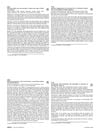 August 2018 in “SDÜ SAĞLIK BİLİMLERİ DERGİSİ”
August 2018 in “SDÜ SAĞLIK BİLİMLERİ DERGİSİ” No method fully prevents hair loss from chemotherapy, but some methods can reduce it and improve quality of life.
 6 citations,
March 2014 in “Herba Polonica”
6 citations,
March 2014 in “Herba Polonica” Plant extracts may help treat hormone-related hair loss.
 3 citations,
March 2021 in “Journal of the European Academy of Dermatology and Venereology”
3 citations,
March 2021 in “Journal of the European Academy of Dermatology and Venereology” The letter is skeptical about the effectiveness of anti-androgen therapy for COVID-19 and calls for strong evidence from clinical trials.
 January 2020 in “Journal of Clinical Dermatology”
January 2020 in “Journal of Clinical Dermatology” Dutasteride helps increase hair density in patients with female-pattern hair loss by activating a new growth mechanism.
 April 1999 in “Therapeutische Umschau”
April 1999 in “Therapeutische Umschau” Hair loss and excessive growth treated with various options, including new laser technology.
 22 citations,
March 2000 in “Clinics in Dermatology”
22 citations,
March 2000 in “Clinics in Dermatology” Many treatments for hair loss lack proper testing and FDA approval, so their effectiveness is uncertain.
 1 citations,
January 2020 in “Archives of Medical Research”
1 citations,
January 2020 in “Archives of Medical Research” Formononetin, found in red clover, may treat hair loss with fewer side effects.
 May 2019 in “Australasian Journal of Dermatology”
May 2019 in “Australasian Journal of Dermatology” The conclusion is that managing hair loss conditions like FFA and melanoma requires individualized approaches, considering new findings and balancing treatment benefits with potential risks.
 February 2009 in “Folia Pharmacologica Japonica”
February 2009 in “Folia Pharmacologica Japonica” Finasteride and minoxidil are the main effective treatments for hair loss from androgenetic alopecia.
 1 citations,
October 2022 in “Adolescent Health, Medicine and Therapeutics”
1 citations,
October 2022 in “Adolescent Health, Medicine and Therapeutics” Gender-affirming therapy can cause skin issues like acne and hair loss in transgender adolescents, and more research is needed on its dermatological effects.
May 2024 in “Journal of clinical medicine” Spironolactone is safe for treating female hair loss, but the safety of other drugs is uncertain.
 38 citations,
January 2019 in “International Journal of Women's Dermatology”
38 citations,
January 2019 in “International Journal of Women's Dermatology” The document concluded that more research is needed to find the best treatment for Frontal fibrosing alopecia.
 77 citations,
March 2001 in “Clinics in Dermatology”
77 citations,
March 2001 in “Clinics in Dermatology” Androgenetic alopecia involves genetics, hormones, and can be treated with medications or surgery.
 2 citations,
August 2016 in “Experimental Dermatology”
2 citations,
August 2016 in “Experimental Dermatology” Finasteride treats baldness but may cause lasting sexual side effects.
 January 2020 in “대한피부과학회지”
January 2020 in “대한피부과학회지” Dutasteride effectively increases hair density in women with hair loss.
 100 citations,
September 1999 in “British Journal of Dermatology”
100 citations,
September 1999 in “British Journal of Dermatology” The study found that two enzymes linked to hair loss are located in different parts of the scalp, supporting a common treatment's effectiveness.
 19 citations,
May 2014 in “Molecules”
19 citations,
May 2014 in “Molecules” Avicequinone C, a compound found in the Avicennia marina plant, can reduce hair loss by inhibiting a hormone linked to androgenic alopecia.
 5 citations,
January 2022 in “Clinical cancer investigation journal”
5 citations,
January 2022 in “Clinical cancer investigation journal” Certain Dibenzo derivatives may help treat prostate cancer.
 47 citations,
January 2001 in “Journal of Investigative Dermatology”
47 citations,
January 2001 in “Journal of Investigative Dermatology” High testosterone to epitestosterone ratio in hair could predict male-pattern baldness.
21 citations,
March 2018 in “JEADV. Journal of the European Academy of Dermatology and Venereology/Journal of the European Academy of Dermatology and Venereology” 5-alpha-reductase inhibitors may help stabilize or slow down hair loss in some frontal fibrosing alopecia patients, but more research is needed to confirm their effectiveness and safety.
 6 citations,
September 2012 in “Clinical Interventions in Aging”
6 citations,
September 2012 in “Clinical Interventions in Aging” Honokiol might help reduce male skin aging by maintaining testosterone levels.
 January 2018 in “Przegla̧d dermatologiczny”
January 2018 in “Przegla̧d dermatologiczny” Hair loss may increase heart disease risk.
 24 citations,
January 2014 in “The American Journal of Chinese Medicine”
24 citations,
January 2014 in “The American Journal of Chinese Medicine” The leaves of Platycladus orientalis have potential health benefits but require more research for safety and understanding how they work.
 52 citations,
September 2018 in “International Journal of Molecular Sciences”
52 citations,
September 2018 in “International Journal of Molecular Sciences” Ginseng and its compounds may help hair growth and prevent hair loss, but more human trials are needed to confirm this.
 20 citations,
June 2007 in “Recent Patents on Endocrine, Metabolic & Immune Drug Discovery”
20 citations,
June 2007 in “Recent Patents on Endocrine, Metabolic & Immune Drug Discovery” Certain inhibitors can potentially treat prostate cancer and other hormone-dependent conditions by controlling sex hormone levels in cells.
4 citations,
July 2018 in “International Journal of Research in Dermatology” Topical finasteride with minoxidil is effective for treating hair loss and may reduce the need for oral finasteride.

Early detection and comprehensive treatment of PCOS are crucial due to its long-term health impacts and associated risks.
 1 citations,
August 2018 in “Journal of The American Academy of Dermatology”
1 citations,
August 2018 in “Journal of The American Academy of Dermatology” Patients with melanoma who saw dermatologists and were from higher-income areas were more likely to have follow-up visits, which was linked to lower mortality.
 55 citations,
July 2013 in “Dermatologic therapy”
55 citations,
July 2013 in “Dermatologic therapy” Some dermatological medications can impair male fertility, so consult a doctor before trying to conceive.
 January 2017 in “Springer eBooks”
January 2017 in “Springer eBooks” The document explains various skin conditions and their treatments.



























